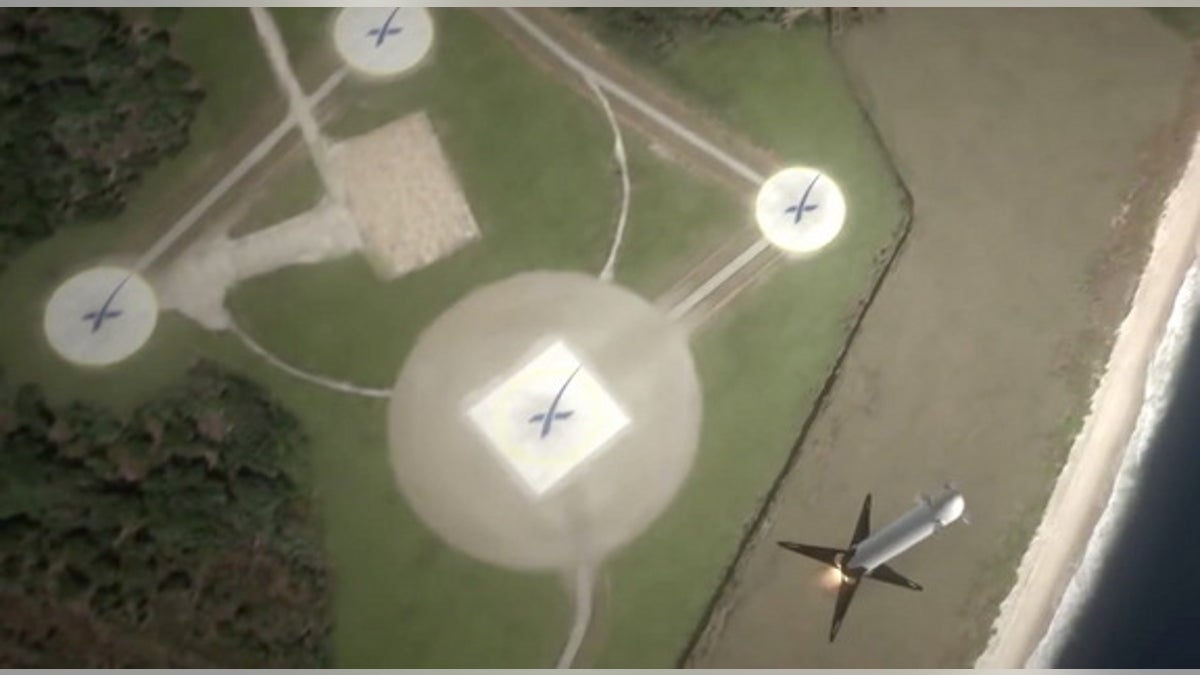
SpaceX is developing reusable Falcon 9 rockets to make spaceflight more affordable. The company plans to land the first stage of its Falcon 9 rockets (shown in this animation still) at its Landing Site 1 at the Cape Canaveral Air Force Station (SpaceX)
CAPE CANAVERAL, Fla. — SpaceX may try to make history with its next launch later this month, returning its rocket to a landing pad rather than an ocean-based platform, a NASA official said today (Dec. 1).
Carol Scott, who works technical integration for SpaceX within NASA's Commercial Crew Program, told reporters here at the Cape Canaveral Air Force Station today that SpaceX's first attempt at a land-based rocket landing may be coming sooner than the public expects.
"You know how they want to fly the stage back, right? Their plan is to land it out here on the Cape [Canaveral] side," Scott told reporters. [Video: Watch SpaceX Try to Land a Falcon 9 Rocket]
SpaceX declined to comment on Scott's remarks when contacted by Space.com.
Still working to recover from its Falcon 9 rocket launch failure in June, SpaceX has been targeting a return to flight for this month. The company is slated to loft 12 Orbcomm OG2 satellites from its Complex 40 launchpad at the Cape Canaveral Air Force Station in Florida in mid-December.
That launch was expected to include SpaceX's next attempt at landing the first stage of its Falcon 9 rocket on an autonomous spaceport drone ship, a floating platform deployed in the Atlantic Ocean. SpaceX representatives, including CEO Elon Musk, have said in the past that if the rocket stages can be recovered and reused, the cost of launching satellites and other payloads could be reduced significantly.
Prior to the June rocket failure, which resulted in the loss of an unmanned SpaceX Dragon spacecraft bound for the International Space Station, SpaceX had twice attempted to land a Falcon 9 booster on an ocean-based drone ship. Both times, the landing failed in the final seconds, resulting in the booster hitting the platform and exploding.
In February, SpaceX leased a former launch facility to create the first-ever "landing pad" at the Cape Canaveral Air Force Station. The company said it intended to transition from using the drone ship to landing on the pad as it advanced its plans for reusing its rockets.
Scott said that if the land-based landing is successful, the Falcon 9 first stage will support SpaceX's ongoing conversion of another launchpad, NASA's Pad 39A at the Kennedy Space Center.
"That first stage, if they successfully get it back, is going to be the test article here," Scott said.
In April 2014, SpaceX signed a 20-year lease with NASA to use Pad 39A to launch its planned Falcon Heavy rocket and Falcon 9 rockets carrying astronauts to the International Space Station. The recovered first stage would enable SpaceX to test its new Horizontal Integration Facility and erector with the modifications it has made to the launchpad in support of starting operations in 2016.
If SpaceX does attempt and succeed at landing its next Falcon 9 rocket's first stage at Cape Canaveral Air Force Station, the feat would come just a few weeks after rival commercial spaceflight company Blue Origin similarly landed its New Shepard rocket after lofting an uncrewed capsule on a suborbital flight.
"Orbital land landing next," Musk wrote on Twitter, responding to Blue Origin's achievement.




















